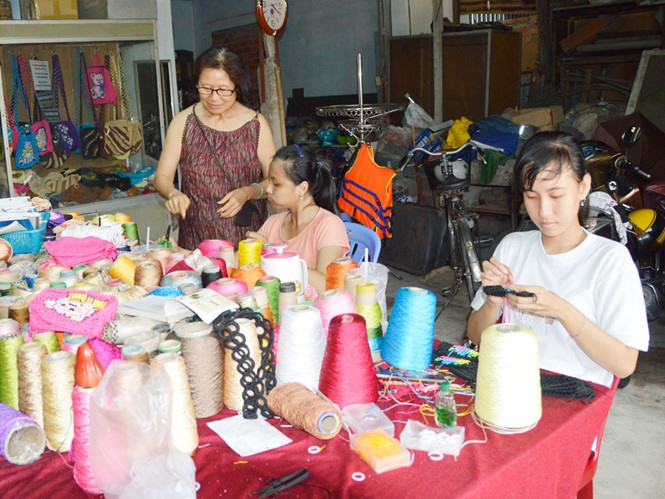 Society
Society

For the last 13 years, a centre in Cần Thơ City’s Ninh Kiều District has become a place where many young disabled people can learn to look after themselves better and earn a living.
 |
| Lê Thị Hồng Hoa teaches disabled students knitting to help them earn a living. — Photo thanhnien.vn |
HÀ NỘI — Over the last 13 years a centre in Cần Thơ City’s Ninh Kiều District has become a place where young disabled people can learn to look after themselves and earn a living.
The centre was started by Lê Thị Hồng Hoa, 64, who decided to dedicate her life to helping those with disabilities after seeing the difficulties they face.
Hoa said that in 2003, she worked as a teacher specialising in teaching knitting at Cần Thơ School for Children with Disabilities.
While working at the school, she became concerned about how to help the students get a job after finishing the course.
After the school stopped teaching knitting in 2005, Hoa opened a centre at home to teach knitting for disabled people free of charge, Thanh Niên (Young People) newspaper reported.
Using the front yard of the house, she roofed with iron sheet metal and bought tables and chairs to set up a vocational training centre for disabled people.
Hoa not only offers free training but also pays them a wage in order to help them support themselves.
By 2011, her centre was licensed to become a private enterprise specialised in vocational training.
She also brings materials for knitting to disabled people who face difficulties walking and then bring their products to market, giving them the profits.
She teaches deaf students through writing.
“I had a lot of worries when I started teaching. But I soon found that they are very eager to learn and very energetic to overcome adversity,” said Hoa.
At present, there are 13 disabled people working at the centre, with difficulties in walking, hearing and speaking.
Hoa said that she has a desire to train deaf and dumb young people to become vocational trainers so that they can teach other children with the same handicap.
In order to help disabled people gain income, Hoa sells their products to consumers or through trade fairs and tourism companies.
Each disabled person earns about VNĐ30,000-40,000 (US$1.3-17) a day.
Nguyễn Hồng Ngọc, 23, a deaf student from Cái Răng District, who studied in the centre two years ago, said that it was very difficult to handle hooks and threads in the beginning.
Ngọc said she had to redo the entire product if a mistake arose during knitting.
But thanks to Hoa’s dedicated guidance, she learnt to complete the products.
"I am very grateful to Hoa for teaching us and creating jobs for us,” Ngọc wrote.
According to Hoa, enterprises face difficulties in employing disabled workers, the biggest problem being poor infrastructure and difficult working environments.
In addition, knitted products are not as popular as other goods. The main products are handbags, wallets, phone bags and hats, but the number of sales is modest, resulting in a shortage of funds to maintain daily operations, Hoa said.
Companies employing disabled labourers like Hoa also said that although the State has policies such as tax breaks and loans for enterprises, the related procedures are cumbersome.
According to the National Disability Committee, Việt Nam now has about eight million people with disabilities.
There are almost 100,000 people with disabilities in Hà Nội and nearly 50,000 in HCM City, according to statistics from the Department of Labour, Invalids and Social Affairs.
Many of them have jobs in businesses and manufacturing establishments in the cities.
Some 87 per cent of them live in rural areas, 65 per cent are of working age, yet only 30 per cent are employed.
Many activities and workshops are organised by the HCM Youth Union in many localities and many organisations and businesses have worked to create jobs for disabled people.
But co-ordination has been poor, and there is no agency responsible for monitoring and researching the number of people with disabilities or how many need vocational training or jobs.
A report of the Việt Nam Social Policy Bank showed that in 2017, more than 2,365 projects of people with disabilities and enterprises employing disabled labourers have received loans, creating jobs for 2,540 disabled workers.
However, more than 11,000 disabled people still need loans. — VNS




